Our team

James Willcocks
Project Director, Kaiwhakahaere Matua
James has led Predator Free Wellington since it begain in 2017. He previously worked at the Department of Conservation for 16 years, in operational and project roles, and also led the National Volunteering Team.
He is driven by the power of engaging communities to create outcomes that benefit everyone and our native taonga.

John Hambidge
Project Leader, Kaiwhakakaupapa Kaitiakitanga
John has worked for the Greater Wellington Regional Council (GW) for over a decade, working in biosecurity and pest animal management. Before that he worked in construction and brought those practical skills to GW. In 2018, GW became delivery partners for Predator Free Wellington. John leads the delivery partnership and the people that work on it, and acts as a link between PFW and GW
Motivated to find solutions to the challenging issue of making Wellington predator-free, John enjoys building the team necessary to achieve that goal.

Isaac Nash
Operational Lead
Isaac holds a BSc in Ecology from Victoria University of Wellington. He previously worked as an Eradication Technical Officer at PFW and says most of his technical experience has come from this project – a great example of building capability in-house.
Isaac loves to see the pace of the project increasing as we learn and refine our methods. He finds it exciting to be part of an internationally significant biodiversity project.
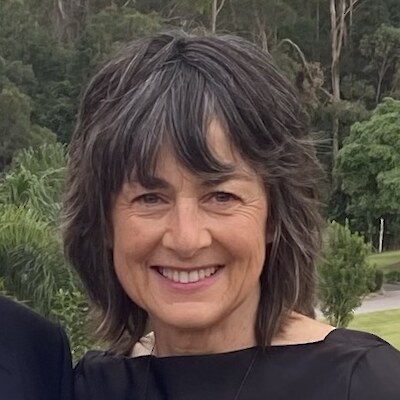
Briony Ellis
Partnerships & Philanthropy
Briony has worked in major events, partnerships and public engagement, in the arts, festivals, sporting events, museums and public projects. She’s been a volunteer trapper since 2016, and runs trapping projects across the greater Wellington area. Combining her work and volunteer passions ‘was the best move ever!’
Briony is driven by the moonshot mission to make Aotearoa New Zealand predator-free by 2050 and the value that brings people and nature – the tūī and kākā are raucous daily reminders that we are doing the right thing!

Kylie Reeves
Communications Manager
Passionate about making conservation accessible to everyone, Kylie brings 15 years of experience in communications and community engagement, alongside a Masters in Organisational Communication. For the past five years at Predator Free Wellington, she has focused on finding innovative ways to engage whole communities – not just environmentalists – to protect our native species.
Currently leading impact communications and our Most Significant Change research project, Kylie works to demonstrate why predator free work matters and how everyone can play a part in this transformation.
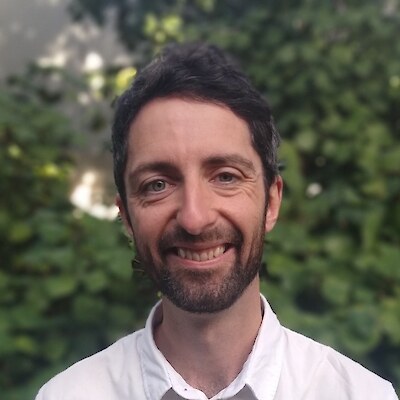
David Klein
Communications Programme Lead
David has a BSc in Biological Science from Canterbury University and has worked in hospitality, event management and communications. Previous roles included comms for Ngā Taonga Sound & Vision and a sustainability consultancy. He runs our website, social media and works with our network of community trapping groups.
David is thrilled to be part of a project making such positive impacts for communities and wildlife across the city.
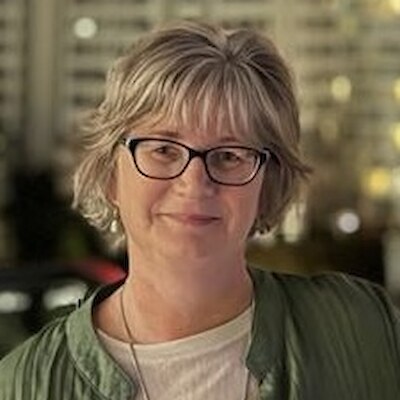
Leigh Cooke
Accountant
Leigh holds a Bachelor of Commerce and Administration from Victoria University of Wellington and has 30 years experience as a Chartered Accountant. She has previously worked in the banking, health, media and education sectors, but finds working for not-for-profits most satisfying.
Leigh has lived most of her life in Wellington and is very pleased to see the progress being made to bring communities together to help protect our native wildlife. She is very proud to be part of the team helping make this happen.

Emma Rowell
Eradication Technical Officer
Emma holds a BSc in Ecology and Biodiversity from Victoria University of Wellington, where she researched predator control in urban environments. She worked for DOC for three years and joined PFW in 2019, working in community engagement before moving to our technical eradication team.
With such positive changes for native wildlife in just a few years, Emma expects more remarkable results in the future, making Wellington an even more special place to live.

Linlin Liu
Eradication Technical Officer
Linlin completed her PhD in Ecology and Biodiversity at Victoria University of Wellington, exploring population dynamics in tuatara. We adapted the model she used to understand rat populations. Linlin also holds a MSc and taught high school biology for 12 years in northeastern China.
Our project is very challenging but Linlin is excited to be part of such ambitious and meaningful work. She also says the huge amount of data we now have also helps us refine how we operate.

Philip Wisker
Eradication Technical Officer
Phil studied archaeology but found preserving living animals was more satisfying than working with extinct ones. He was a zookeeper for 20 years, caring for native birds. Working for Rentokil taught Phil how to remove rats, skills he brought to PFW in 2019.
Phil says the project is making great progress. He was recently impressed by how many bird species he saw on Miramar Peninsula compared to the Marlborough Sounds.

Jay
Field Supervisor, Kaitiaki-a-papa
Jay has experience working in conservation, zoos and animal management. He volunteered as a community trapper on Rakiura Stewart Island and jumped at the chance to be one of our first field operators. As a Field Supervisor he works with the team checking traps and bait stations across the city.
Seeing our project build to create a city-wide Predator Free Wellington motivates Jay. He also loves hearing from residents about the increases in wildlife they’re noticing.

Jed
Field Supervisor, Kaitiaki-a-papa
Jed holds a BSc in Ecology and Biodiversity from Victoria University of Wellington. He loves animal behaviour and has worked on animal monitoring projects around the country and in New Caledonia. He worked as a field researcher at Goodnature, studing rat behaviour and management. As a Field Supervisor, Jed works with the team checking traps and bait stations across the city.
Seeing the progress we’re making motivates Jed. He also finds it awesome to live in the project area and make a difference literally in his own backyard.

Sebastian
Field Supervisor, Kaitiaki-a-papa
Sebastian grew up in Golden Bay and volunteered with several conservation projects. He studied Environmental Science and Philosophy at Victoria University of Wellington and joined our team in 2021. As a keen rock climber Sebastian installs guide ropes in some of the city’s steepest areas to help access rat habitat.
Sebastian loves the challenge of our project and its clear goals. He also finds the huge scale of the work – and that we’re removing rats from the city – remarkable.

Alastair
Field Supervisor Community Outreach, Kaitiaki-a-papa
Alastair loves the outdoors and volunteers with RAMBO. He previously worked as a primary school teacher and was pleased to move into conservation work when our project began. He started as a Field Operator and now leads our Community Outreach team. This role sees him work with residents and volunteers to gain permissions to help build our trap network.
Alastair finds the project exciting, innovative and hugely ambitious. He also loves the team culture.

David
Community Outreach Officer, Kaitiaki-a-papa
David holds a BSc in Ecology and Environmental Science from Victoria University of Wellington. He started as a Field Operator after roles with Conservation Volunteers and as a student ranger at Auckland Council. He now works with our volunteers and with residents to gain permissions to help build our trap network.
David is excited to be part of a world-first project and loves how we continue to refine all parts of our operation. The community support we receive also means a lot!

Sandra
Community Outreach Officer, Kaitiaki-a-papa
Sandra studied a Bachelor of Biological Science at the University of Auckland, with a special interest in ecology and conservation. She moved from Auckland in mid-2022 to join our team as a Field Operator: ‘one of the best decisions I’ve ever made’. Sandra then moved into Community Outreach, working with volunteers and residents to gain permissions to help build our trap network.
Sandra loves the feedback we receive from the public, and often hears stories from residents about the changes they’ve seen, particularly fewer rats and more tūī.

Blaire
Field Operator, Kaihopu taiao
Blaire holds a Bachelor of Science in Biochemistry and Ecology from Canterbury University, and has a background in environmental restoration. She previously worked with the Greater Wellington Regional Council in pest plant and animal control.
Blaire spent a lot of time in the ngahere growing up and is delighted to now work outdoors in a role she finds super fulfilling. She also loves seeing the difference her work makes, like more bird and wildlife.

Blake
Field Operator, Kaihopu taiao
Blake grew up in Dunedin and volunteered for a couple of years on conservation projects including the Halo Project. This taught him how to install and check traps and he also took some short conservation courses through Nelson Marlborough Institute of Technology.
As a Field Operator, Blake enjoys working outside and is grateful to be part of such a significant project. He loves talking with people and hearing about the changes they are seeing.

Caitlin
Field Operator, Kaihopu taiao

Craig
Operational Field Support Officer
Craig has a background in tourism and hospitality, connecting with people and showing them around Wellington as a tour guide. A hands-on problem solver, he also has experience on construction and farm sites. This helps with trap design, placement, innovation and maintenance – a bit of everything!
Craig finds both the work and the team inspiring and motivating, and loves to work on such an audacious project.

Ellen
Field Operator, Kaihopu taiao
Ellen gained a Bachelor of Environmental Science in Ecology and Biodiversity from Victoria University of Wellington, before completing a Masters in Ecological Restoration. Her thesis involved radio-tracking rats, which gave her valuable insights into their behaviour. Ellen also guides twilight and night tours at Zealandia.
As a Field Operator, Ellen loves the positive feedback she hears about our project – people are noticing the increases in birds, insects and lizards!

Keaton
Field Operator, Kaihopu taiao
Keaton took the Trainee Ranger course at Nelson Marlborough Institute of Technology. His placement was with DOC in Whangārei where he worked with pest plants, maintained walking tracks and helped fishers follow regulations. Joining our team opened up a side of conservation work that was more exciting than he imagined.
Keaton loves how his role protects the taonga of our outdoor spaces and leaves them in a better place for future generations to enjoy.
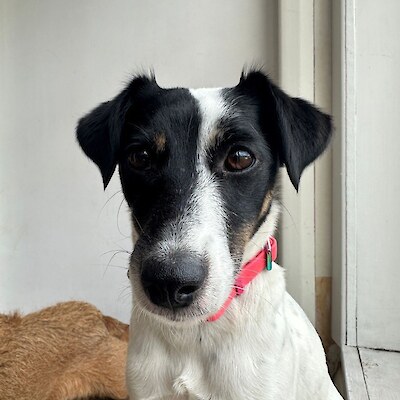
Kimi
Super sniffer
Kimi is a two year old Fox Terrier and a fully certified rat detection dog. Her father Macca detects mustelids with the Department of Conservation. She is a very delicate little dog until she finds a rat, then her demeanour changes fast!
Kimi loves cuddles on the sofa and slips and slides down hills for fun while she waits for Sally to catch her breath.

Meegan
Field Operator, Kaihopu taiao
Meegan holds a Graduate Diploma in Ecology and Biodiversity, and a Masters in Conservation Biology, both from Victoria University of Wellington. Originally from warm and sunny Whangārei, she moved down to study 10 years ago and has called Wellington home ever since.
Meegan joined the team in mid-2022 and loves that our project benefits everyone in the city equally. She also loves meeting everyone’s pets when she’s checking traps at people’s homes.

Rachelle
Field Operator, Kaihopu taiao
Rachelle holds a BSc in Environmental Science and a Masters in Environmental Management, both from Lincoln University. She has worked to remove pest plants and possums in Nelson, and as a Coastal Ranger in New Brighton. She moved to Wellington for this role and now also volunteers with Places for Penguins.
Rachelle is excited to be part of a world-first project, loves the team and enjoys meeting residents.
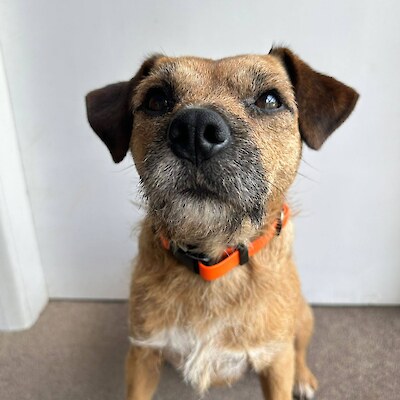
Rapu
Super sniffer
Rapu is a Border X Parsons Terrier who sniffs out rats across Wellington, especially in areas where we’ve removed predators. His dad is a wallaby detector and his mum also finds rodents.
Rapu’s handler Sally says he’s ‘a very stubborn little character’ but is so good at his job. He loves alternative forms of transport like quad bikes, helicopters and especially boats!
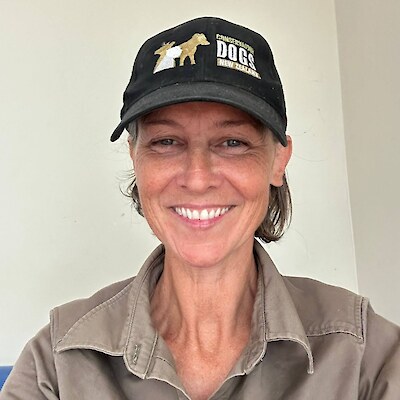
Sally
Dog handler
Sally grew up hunting possums and rats in Lower Hutt. She saw the difference pest control was making in her local forest and got involved with predator trapping. This led to becoming a Conservation Dog handler through the Department of Conservation. Sally, Rapu and Kimi help us find rats and they also work around the country.
Sally finds it satisfying to see all the dog training in action. She also loves meeting the public and getting to know so many spaces around Wellington.

Sam
Field Operator, Kaihopu taiao
Sam has a Bachelor of Science in Biology and Environmental Science, and a Masters in Conservation Biology, both from Victoria University of Wellington. He has worked in environmental monitoring on the West Coast, doing pest and weed control. His Masters investigated nest box selection for hihi stitchbird at Zealandia.
Sam loves the project and enjoys working outside. He is also excited to work with so many other passionate people.

Sean
Field Operator, Kaihopu taiao
Sean has a Graduate Diploma in Biology from Victoria University of Wellington. He previously worked with Trap and Trigger, gaining hands-on experience in different conservation projects around the country, like wilding pine and predator control. He initially joined our team through Trap and Trigger before becoming a full-time field operator role with us.
Sean is incredibly proud to work on this pressing conservation project. The major increases in birds, skinks and insects shows how important our work is.

Sophie
Field Operator, Kaihopu taiao
Sophie started backyard trapping in 2016 and in 2020 took over as coordinator of Predator Free Lyall Bay. She interned with us during 2021 and has completed the Department of Conservation’s Predator Trapping Methods and Conservation Field Skills courses. Sophie is especially eagle-eyed at spotting rats on camera and seeing their teeth marks on chew cards.
Sophie loves the excitement of residents when we arrive in a new area and enjoys seeing the amazing bird life in suburbs we have cleared.
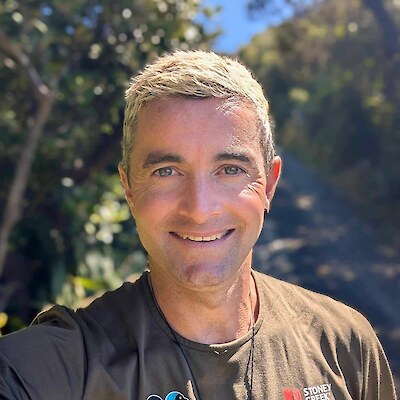
Tim
Field Operator, Kaihopu taiao
Tim grew up in Miramar and spent heaps of time in the outdoors with his family. He volunteered with Predator Free Miramar and his background in adventure racing meant he could handle some of the steepest terrain around the motu. As an experienced upholsterer, Tim has helped reinforce and modify the field team’s packs.
Tim is thrilled to see bird and wildlife thriving on Miramar. He loves to feel that he is making a positive change in the world.
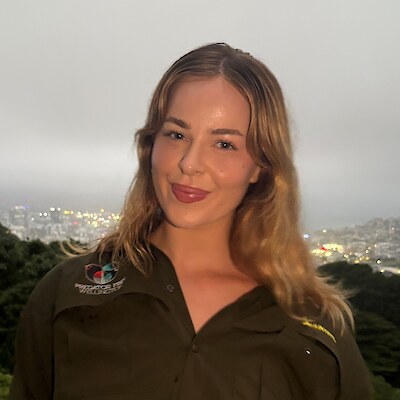
Zara
Field Operator, Kaihopu taiao
Zara has a Masters in Conservation Biology from Victoria University of Wellington, with an undergrad in psychology and neuroscience. She interned with an Auckland environmental consultant, working on freshwater ecology and fish passage projects.
Zara enjoys how supportive and engaged the public is in our project and its outcomes. She also loves to see the birdlife when working in the field.
Our Board

Tim Pankhurst
Chair
Tim is an author, journalist and former editor of Wellington’s The Dominion Post, Christchurch’s The Press and Hamilton’s Waikato Times. Tim was also chief executive of the Newspaper Publishers’ Association and Seafood New Zealand. He’s a keen fisher and diver and loves the waters of coastal Wairarapa and Cook Strait.
As a Karaka Bay resident, Tim was a pioneer trapper on the Miramar peninsula and has seen firsthand the significant improvements to our native wildlife when rats and mustelids are removed.

Bridget Abernethy
Director, Ringatohu
Bridget is the Chief Executive of the Electricity Retailers’ Association (ERANZ) and has considerable experience at the executive level. She is a corporate communications and public affairs expert and has worked as project director in conservation and business. She has helped to deliver the EnergyMate programme, which creates warmer and drier homes for families across Aotearoa.
Bridget has spent most of her life in Wellington and loves seeing the impact of the Predator Free Wellington work
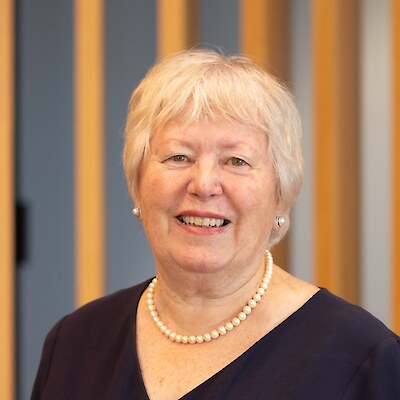
Denise Church
Director, Ringatohu
Denise has worked in environmental management and research roles, and was formerly the Chief Executive at the Ministry for the Environment. In addition to being on our Board, she chairs the Board of Predator Free 2050 Limited and Airways New Zealand. She also consults on strategy and leadership.
Denise is excited to bring her governance experience to such ambitious conservation projects and enjoys spending time in the hills of Wellington.

Devon Maclean
Director, Ringatohu
Devon has held senior roles in the forest industry and governance roles with Scion, the NZ Conservation Authority and the Biological Heritage National Science Challenge. He was instrumental in founding Project Crimson, Project Janszoon and a series of NEXT Foundation environmental projects. In 2015 he was awarded a Queens Service Medal for services to the environment. In 2024 he was appointed as a Commissioner of the NZ Climate Change Commission.
Devon is excited to bring his experience to the ambitious work of Predator Free Wellington and looks forward to the transformation it will bring to our capital.

Justin Lester
Director, Ringatohu
Justin is the former Mayor of Wellington and was a City Councilor for six years. He now works as a Director for Dot Loves Data, helping businesses make better decisions using data. Justin uses his business experience as part of the Board’s fundraising subcommittee.
Justin enjoys running through the hills of Wellington and loves seeing and hearing the native wildlife returning.

Holden Hohaia
Director, Ringatohu
Holden (Taranaki Whānui ki te Upoko o te Ika and Ngāti Maru) is the General Manager Te Tiriti Strategy at Manaaki Whenua (Landcare Research). He was the former Chair of Taranaki Whānui ki te Upoko o te Ika and served on the Board for Experience Wellington. He is also a Trustee of Ngāti Maru and is a qualified lawyer.
Holden has always lived in Pōneke and is excited about how our project is changing the city.

Terese Mcleod
Tuakana Teina
Terese (Taranaki Whānui, Clan McLeod) is the Bicultural Engagement Lead Ranger at Zealandia Te Māra a Tāne. She is kaitiaki of Matiu/Somes, Mokopuna and Mākaro Islands and is campaigning to grant the Kaiwharawhara Awa legal personhood.
Through being part of these environmental projects, Terese is delighted to connect with te taiao every day and see the changes happening across the city.
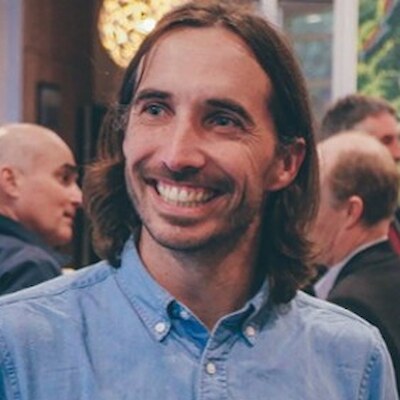
Stu Barr
Advisor to the Board, Kaiwhakahaere
Stu studied Industrial Design at Victoria University of Wellington and went on to co-found Goodnature, a company focused on innovative and humane pest control. With expertise in business leadership and management, Stu now supports local businesses and charities, to sustainability and success. On our Board, Stu advises on fundraising, finance, and campaign strategy.
He loves being outdoors, volunteering on conservation projects, riding mountain bike trails, or surfing around the country. Stu’s passionate about the long-term impact the project is having on biodiversity and community across the city.
